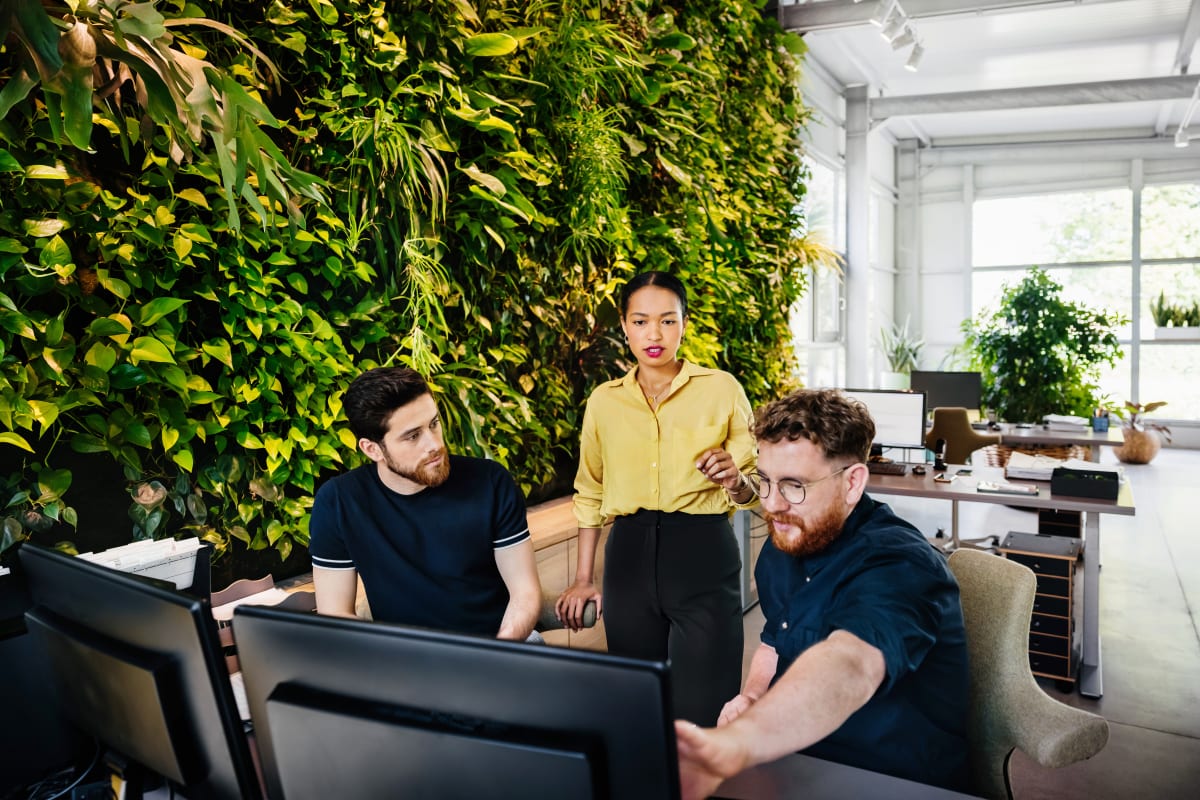Green offices are taking the business world by storm – and for a host of reasons. Here’s why businesses are on the hunt for eco-friendly flexspace, and how brokers can leverage rising demand to increase their chances of a successful deal.
Across the world, green office spaces are in demand. According to commercial real estate experts Knight Frank, London boasts nearly 3,000 green-rated buildings, while in America, Seattle has the 2030 district – home to a number of green buildings including the Bullitt Centre, considered one of the world’s most sustainable. In Asia, nine in ten of Singapore’s Grade A office stock are certified green. The city is also one of the best-known examples where architects and planners use plants on the outside of buildings to combat pollution and high temperatures. IWG's offices are also at the forefront of this green office movement. Every IWG workspace is carbon neutral, helping businesses progress with their own ESG goals.
So what's prompted this eco-friendly evolution? Let's look at the driving forces.
The business benefits of green offices
Given the myriad advantages they offer, it's unsurprising that businesses are increasingly prioritising green office spaces. Key benefits include:
- Meeting sustainability targets: Green offices enable businesses to meet their Environmental, Social and Governance (ESG) targets – not just as a regulatory measure, but as a conscientious commitment to our planet and society.
- Quantifiable cost savings: Findings from a 2020 report by MDPI suggested that greener buildings contributed towards a 5% reduction in operating costs.
- Attract clients: Operating from a green office is a visible sign that a business walks the walk when it comes to sustainability, and so helps attract the growing number of eco-conscious clients. Findings from a 2020 report by MDPI suggested that green-certified buildings contributed towards a 4% increase in occupancy.
- Reputational boost: By extension, this genuine commitment to sustainability helps distinguish the brand in an eco-conscious market.
- Boosts wellbeing: Biophilic office design, by incorporating nature into the workplace, not only enhances mental and physical health, immunity, and happiness but also promotes better air quality — contributing to increased productivity and fewer sick days. Highlighting the importance of air quality, a 2021 Harvard University study revealed that doubling ventilation to 40 CFM/person elevated participants' cognitive performance from the 62nd to the 70th percentile.
- Retaining and attracting talent: As Knight Frank points out, “Today’s workforce is becoming increasingly green-conscious, and they’re on the hunt for businesses that match up to their values.”
Brokers are well-positioned to tap into the growing demand for green office space, potentially leading to more successful deals and the opportunity for premium pricing. Knight Frank estimates that green offices in London command a 12% rental premium and a 10-11% sales premium, a trend they expect to see repeated across all property markets.
Here’s how IWG is meeting the green office demand
Today, two-thirds of workers in the USA can operate remotely. At the same time, 84% of UK employees who adapted to remote roles during the pandemic intend to maintain a hybrid way of working. As a result, businesses no longer require expansive, energy-consuming traditional office spaces that remain underused for significant portions of the week.
IWG's role in helping businesses shift to the hybrid model has a direct positive impact on two major environmental concerns. Guiding organisations to shift from their larger, traditional office settings to advanced, eco-friendly shared workspaces leads to energy savings, especially in heating, cooling, and lighting. This is significant because, according to the US Green Building Council, office buildings are responsible for 41% of the world's average energy use. But that's just part of the story. By providing local flexspaces closer to where employees live, IWG is also helping to drastically reduce the need for long-distance daily commutes. This means more employees can walk or bike to work, reducing vehicle emissions and leading to cleaner air.
Global companies, including Cisco, Deloitte, and HSBC, are among those leveraging IWG's offerings. By embracing the hybrid model, they are minimising their own operational impact and carbon footprint.
What’s more, and as mentioned earlier, all IWG’s locations are certified carbon neutral, underscoring their own commitment to protecting the planet. Here are some of the IWG flexspaces raising the environmental bar around the world:
- Regus One Welches, Barbados: this workspace boasts the Caribbean island’s largest solar carport and electric vehicle charging infrastructure, which generates enough electricity to power a Nissan Leaf for more than two million kilometres of travel a year.
- Spaces Tour & Taxis, Brussels: this innovative building is energy neutral, partly thanks to the gardens, which help regulate the internal temperature and are watered using collected rainwater.
- Spaces Tullinløkka, Oslo: this location was built from 80% recycled materials, with the use of reclaimed tiles alone saving 34,000kg of CO2 during the construction phase of the project.
- Signature Star Metals, Atlanta, USA: at this workspace, a special drainage system captures and stores over 56,000 gallons of rainwater.
- Spaces Jubilee Place, Brisbane, Australia: our Brisbane office has a 6-star Green Star design rating thanks to eco-friendly features including green roof coverage, rainwater harvesting, solar power and use of natural light.
As these innovative locations show, partnering with IWG is a great way for brokers to meet their clients’ demand for green workspace. Discover how an IWG partnership can make it easier for you to find the perfect green office solution for your clients.






